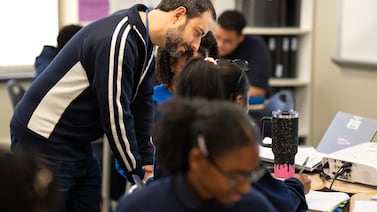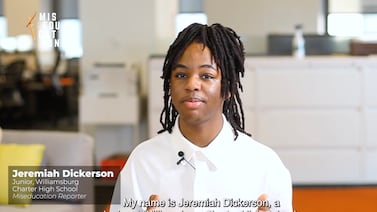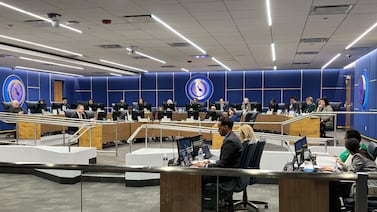Sign up for our free monthly newsletter Beyond High School to get the latest news about the role of college and career education in Colorado.
Students who attend The Learning Source’s Pueblo location share some common goals — they want to learn English or get their high school education.
Yet they have varied ideas about what they want to do with that education. Yadira Granados, 28, wants to expand her businesses. Yessica Gallegos, 37, wants to someday get a business degree, possibly at Colorado State University Pueblo. And both want to help their kids.
“When I travel, I want to understand the people that talk to me,” Granados said. “And I want to talk with my children.”
Providers of adult education in Colorado say they value these diverse outcomes. But requirements for the federal grants that fund their work are more narrowly focused on getting adult students ready for the workforce and demonstrating the success of those efforts. In line with that philosophy, Colorado officials are now asking local providers for more workforce-related data about their programs as a condition for passing along federal adult education funding.
Some providers said they don’t have that data, which means they may be forced to forgo the federal grants and rely solely on the sparse state funding available for adult education that’s not linked to job readiness. If that happens, they fear, classes like the ones that Granados and Gallegos take at The Learning Source Pueblo could soon disappear.
Josh Evans, The Learning Source’s CEO, said thousands of Colorado adults could lose out.
About 300,000 Colorado adults do not have a high school diploma, according to state numbers.
“We’re talking about individuals who have a good amount of barriers to employment and self sufficiency,” Evans said. “And this is just increasing those markers of difficulty for them.”
Few basic adult education resources
Many students want more out of an adult education program than just job skills, said Paula Schriefer, president and CEO of the Spring Institute, which helps refugees and immigrants learn English and get a basic education.
“They want to be able to talk to their neighbors. They want to help their kids in school. They want to be able to communicate with doctors. They want to be able to go to the pharmacy and fill a prescription,” she said. “And the reality is there’s just not a lot of funding to help people who might have those kinds of goals.”
Colorado does provide money for students like Grandaos and Gallegos who strive for more than just a job, but it has been far less than other states. In 2020-21, a ProPublica analysis showed Colorado spent $7 per eligible adult. Last year, lawmakers doubled funding, to about $3 million statewide.
That’s why the federal Adult Education and Family Literacy Act grant is such a valuable stream of money for providers.
The grant’s focus is to get adults basic skills that lead to college or employment. And the federal government already makes it hard for many adults to be considered for this money.
But adult education providers who use the grant say the bigger issue is one that the state’s Adult Education Initiatives office created with the new documentation requirements.
They say that in February, the office changed, without notice, application requirements for what providers must prove to be eligible to receive funding within the next grant cycle.
The state says organizations must show data about students, such as the median income and the employment rate of those who complete programs, before the state distributes the federal funding.
The Colorado Department of Education said in a statement that the federal requirements have always been in place. The department maintains it is following the grant application rules as specified by the federal government.
But providers say they do not have that information readily available, and that will keep them from using the federal grant in the future.
In a letter dated March 12 to the Colorado Department of Education and Gov. Jared Polis, adult education providers say they’re worried that the state is leaning too heavily on this information to qualify them for the grant.
The letter is signed by representatives from Jefferson County Public Schools, Metropolitan State University of Denver, Emily Griffith Technical College, and the Spring Institute, and others.
Evans, whose nonprofit organization uses the grant, said his organization has only loosely tracked the information, and it is unreliable. He said it’s unfair to make organizations show a history of data that his organization and others haven’t needed to report on.
“There’s multiple programs that were running this program in good faith for four years, and now they’re ineligible,” he said.
Organizations across the state said they are bracing for cuts. The Learning Source estimates it will likely need to close about five locations, reduce services offered, and lay off 20 to 40 instructors due to reduced funding. And Jefferson County Public Schools foresees closing two locations and displacing 13 instructors and about 1,000 adult learners.
Adult education providers raise other issues
The organizations say there are other issues with the Adult Education Initiatives office, and that getting information from the office has been difficult.
In a second letter sent April 1, eight adult education providers listed concerns that include later-than-expected payment of state grant money that’s left them a short window to spend the funds on adults. The letter also says the office has failed to meet its own self-imposed deadlines.
Communication from the Adult Education Initiatives office has been “sorely lacking,” they added.
“Immediate action is needed to streamline funding processes, improve communication and collaboration, and provide essential technical assistance and training to support program success,” the groups said in the letter.
A Colorado Department of Education spokesman said in a statement that it “welcomes feedback from our community.” The department held a meeting with adult education providers on April 11.
Schriefer said few providers across the state say the office is working effectively. The department acknowledged communication issues during the meeting, she said, and she wants to see the relationship improve, because conflicts make accessing limited funding harder.
This article has been updated to clarify that the Colorado Department of Education is following federal grant requirements in selecting grant applicants.
Jason Gonzales is a reporter covering higher education and the Colorado legislature. Chalkbeat Colorado partners with Open Campus on higher education coverage. Contact Jason at jgonzales@chalkbeat.org.






